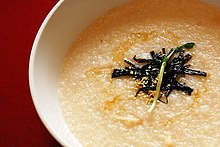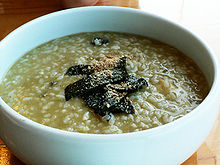Jeonbok-juk
 Jeonbok-juk made without the abalone's internal organs | |
| Type | Juk |
|---|---|
| Place of origin | Korea |
| Serving temperature | warm |
| Main ingredients | Abalone, rice |
| 58 kcal (243 kJ)[1] | |
| Korean name | |
| Hangul | 전복죽 |
|---|---|
| Hanja | 全鰒粥 |
| Revised Romanization | jeonbok-juk |
| McCune–Reischauer | chŏnbok-chuk |
| IPA | [tɕʌn.bok̚.t͈ɕuk̚] |
Jeonbok-juk[2] (전복죽; 全鰒粥), or abalone rice porridge,[2] is a variety of juk (죽; 粥), or Korean porridge, made with abalone and white rice. Abalone is regarded as a high-quality ingredient in Korean cuisine and was often presented as a gift to the king of Korea.[3] The dish is a local specialty of Jeju Island, where abalone are commonly harvested. Jeonbokjuk is known as not only a delicacy but also as a nutritional supplement and digestive aid, especially for ill patients or elderly people.[3][4] Jeonbokjuk can be made with or without the abalone's internal organs. The former type of jeonbokjuk has a green tinge, while the latter is more ivory in color.[5]
Preparation and serving
[edit]Abalone are first prepared by cleaning with a brush in water, and the flesh is taken out from the flat and middle of the shells with a small kitchen knife. The internal organs are removed separately from the flesh, taking care not to damage them. The flesh is slightly parboiled in a pot of boiling water and then thinly sliced. Rice is soaked in a bowl of water for 3 to 4 hours before cooking. The abalone flesh is stir-fried in a pot over a medium flame with sesame oil, with the soaked rice then added. After stir-frying for a while, water is poured into the pot, and the dish is cooked at a higher temperature. Constant stirring prevents the ingredients from sticking to the bottom of the pot. After the dish has come to a boil, the heat is lowered and allowed to simmer. The dish is seasoned with salt, or ganjang (Korean soy sauce).[6]

See also
[edit]References
[edit]- ^ "jeonbok-juk" 전복죽. Korean Food Foundation (in Korean). Retrieved 16 May 2017.[permanent dead link]
- ^ a b (in Korean) "주요 한식명(200개) 로마자 표기 및 번역(영, 중, 일) 표준안" [Standardized Romanizations and Translations (English, Chinese, and Japanese) of (200) Major Korean Dishes] (PDF). National Institute of Korean Language. 2014-07-30. Retrieved 2017-02-15.
- 주요 한식명 로마자 표기 및 표준 번역 확정안 공지. National Institute of Korean Language (Press release) (in Korean). 2014-05-02.
- ^ a b "Jeonbokjuk (Rice porridge with abalone)". The Jeju-do government's official website / EncyKorea. Archived from the original on 2007-12-28. Retrieved 2008-05-31.
- ^ (in Korean) Jeonbokjuk Archived 2011-06-10 at the Wayback Machine at Encyclopedia of Korean Culture
- ^ (in Korean) Jeonbokjuk, the color of Jeju's sea, Jeju Sori, 2009-02-19. Retrieved 2010-07-02.
- ^ (in Korean) Jeonbokjuk[permanent dead link] at Doosan Encyclopedia
- "Korean cuisine" (PDF). Jeonbokjuk (Abalone Porridge). Korea Tourism Organization. p. 20. Archived from the original (PDF) on 2009-04-08.
